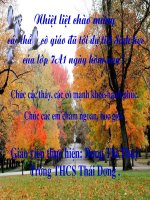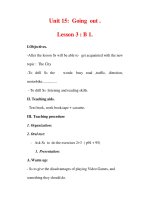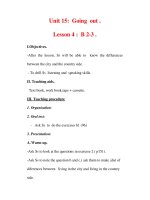Tải Giáo án Tiếng Anh lớp 7 Unit 15: Going out - Giáo án điện tử môn Tiếng Anh lớp 7
Bạn đang xem bản rút gọn của tài liệu. Xem và tải ngay bản đầy đủ của tài liệu tại đây (150.29 KB, 7 trang )
<span class='text_page_counter'>(1)</span><div class='page_container' data-page=1>
<i>Planning date:</i>
<b>Period 91. Unit 15: going out</b>
lesson 1: a1. p.147.
<b>I. Aims: </b>
- To help ss further practice in Wh - questions and giving advice for not doing
something.
- To develop ss’skills.
<b>II. Objectives: By the end of the lesson, ss will be able to give advice for not doing </b>
something.
<b>III. Ways of working: T - WC, pair work, individual work.</b>
<b>IV. Materials: Text book, pictures, tape, cards.</b>
<b>V. Anticipated problems:</b>
<b>VI: Teaching steps:</b>
<b>1. Warm up: (1 minute) Greet wand check the ss’attendance.</b>
<b>2. Revision: </b>
<b>3. New lesson:</b>
STAGES ACTIVITIES ON BOARD
PRESEN
TATION
(16
minutes)
<b>* Preteach:</b>
- Teacher uses techniques to
teach students new words.
- Teacher sets the scene, plays
the tape and elicits the model
sentences.
- Concept checking:
+ What do these sentences
mean?
+ When do we use these
sentences?
+What kind of sentence is the
question?
+ Which word do we use at the
beginning of the sentence?
Next?
+ How do we promiss?
<b>I. New words:</b>
- the amusement center: trung tâm giải trí
- addictive (adj): gây nghiện
- the arcade: khu vui chơi giải trí có mái
vòm
<b>II. Model sentences:</b>
- Don't spend too much time in the
arcade.
- No, I won't.
PRACTICE
(13
minutes)
PRODUC
TION
(12
minutes)
<b>* Comprehension questions: </b>
<b>A1. P.147 (a - g)</b>
- Students answer the question
A1. P.147.
<b>* Mapped dialogue:</b>
Example exchange:
S1: Where are you going?
S2: I'm going to the amusement
center.
S1: What are you going to do?
S2: I'm going to play video
games.
S1: How often do you play?
S2: Twice a week.
S1: Don't spend too much time
playing video games.
<b>III. Answer the comprehension </b>
<b>questions: A1. P.147:</b>
* Answer key:
a) He's going to the amusement center.
b) He's going to play video games.
c) He goes to the amusement center about
once a week.
d) No, he doesn't. He doesn't spend much
money.
e) He usually stays for about half an hour.
f) Nam must be careful because video
games can be addictive.
g) He'll do his homework later.
* Mapped dialogue:
<b>You</b> <b>Your friend</b>
Where... going?
What ... do?
How often...?
Don't spend....
video games.
Don't forget...
homework.
... amusement
center.
Video games.
...2 / week.
X
</div>
<span class='text_page_counter'>(2)</span><div class='page_container' data-page=2>
S2: No, I won't.
S1: Don't forget to do your
homework.
S2: No, I won't.
<b>4. Consolidation:(1 minute)</b>
- Ss retell the main points of the lesson:
<b>5. Homework: (3 minutes)</b>
- Learn by heart all the new words and model sentences.
- Read the dialogue A2. P.147 again.
- Do exercise: A1. P.94 (workbook)
<b>* Teacher guides students to do the exercise:</b>
A1: Chia động từ cho trong ngoặc, dùng thì hiện tại đơn hoặc thì hiện tại tiếp diễn.
...
.
<i>Planning date:</i>
<b>Period 92. Unit 15: going out</b>
lesson 2: a2. p.148 - 149.
<b>I. Aims:</b>
- To help students read for details about videos and video games.
- To develop students' skills.
<b>II. Objectives: By the end of the lesson, students will be able to understand the </b>
reading and understand more about video.
<b>III. Ways of working: T - WC, team work, individual work.</b>
<b>IV. Materials: Textbook, pictures, additional board.</b>
<b>V. Anticipated problems: The lesson may take time.</b>
<b>VI. Teaching steps:</b>
<b>1. Warm up: (1 minute) Greet and check the students' attendance.</b>
<b>2. Revision: (4 minutes) Students do exercise A1 (Homework)</b>
<b>3. New lesson:</b>
STAGES ACTIVITIES ON BOARD
(PRE
READING
(12
minutes)
<b>* Preteach vocabulary:</b>
- Teacher uses techniques to
teach students new words.
- Checking understanding:
* What and where:
<b>* True / False prediction:</b>
- Students predict whether the
statements true or false.
<b>I. New words:</b>
- dizzy (adj): chóng mặt
- social skill: kĩ năng xà hội
- an inventor: nhà phát minh
- the premise /p'<sub>remis/: nhà cửa, vờn tợc</sub>
- the industry: c«ng nghiƯp
- a robbery: vơ cíp
<b>II. True / False prediction:</b>
1. Children like playing video games
because they are good fun.
2. It's very good for children to spend too
much time on their own.
3. Playing video games for a long time can
make children become dizzy.
4. Children mustn't play outdoors with their
friends.
5. Some inventors become rich when they
are very young.
WHILE
READING
(15
minutes)
<b>* Reading: A2. P148:</b>
- Students read the text for the
first time and check their
predictions.
- Students read the text again
and guess the meaning of the
given words.
- Students read again and do
<b>III. Reading: A2. P.148:</b>
<b>1. Checking true - false predictions:</b>
* Answer key:
1. T 2. F 3. T 4. F 5. T
<b>2. Matching: (With answer key)</b>
L4: careful chơi ngoài trời
L9: play outdoors quên
L9: develop phát triÓn
L12: forget cÈn thËn
<b>3, Multiple choice:</b>
</div>
<span class='text_page_counter'>(3)</span><div class='page_container' data-page=3>
the multiple choice. a) D b) A c) D d) B
POST
READING
(10
minutes)
<b>*Grid:</b>
- Students complete the grid,
answer the the questions:
"What should we do? What
shouldn't we do?"
Eg exchange:
S1: We should play outdoor
S2: Yes, we should
<b>II. What should we do? What shouldn't </b>
<b>we do?</b>
(With answer key)
<b>Activities in free time</b> <b>should shouldn't</b>
Play outdoors
Play video games for a
long time
Take part in activities with
friends
Spend a little time playing
video games
Spend too much time on
your own
<b>4. Consolidation:(1 minute)</b>
- Ss retell the main points of the lesson:
<b>5. Homework: (2 minutes)</b>
- Learn by heart all the new words and read A2 again.
- Do exercise : A3. P.96 (workbook)
* Teacher guides students to do the exercise:
A3: Dùng từ cho trong khung để hoàn thành câu.
<i>...</i>
<i>.</i>
<i>Planning date</i>
<b> Period 93. Unit 15: going out</b>
lesson 3: b1, 2. p.150 - 151.
<b>I. Aims: </b>
- To help students read for details about life in the city and life in the country.
- To develop students' skills.
<b>II. Objectives: By the end of the lesson, students will be able to understand the </b>
reading in details.
<b>III. Ways of working: T - WC, team work, individual work.</b>
<b>IV. Materials: Textbook, tape, additional board, color chalk.</b>
<b>V. Anticipated problems: The "discuss" activity may be difficult for some students.</b>
<b>VI. Teaching steps:</b>
<b>1. Warm up: (1 minute) Greet and check the students' attendance.</b>
<b>2. Revision: (5 minutes) * Wordsquare:</b>
h r o B h g i e n
o c l U b z w s c
o z k S J v q i e
d r s Y m n t o g
m z j R k y t n a
o p c O q z e j l
t t r A f f i c l
o x l D r n u b i
r b i K e s q k v
<b>* Answer key:</b>
neighborhood
quiet, noise, village
traffic, club
city
busy road
motorbike
<b>3. New lesson:</b>
STAGES ACTIVITIES ON BOARD
PRE
READING
(9
minutes)
<b>* Preteach </b>
<b>vocabulary:</b>
- Teacher uses
techniques to teach
students new words.
<b>I. New words:</b>
- the rest: phần còn lại
- (to) awake: thøc giÊc
- (to) scare: sỵ
</div>
<span class='text_page_counter'>(4)</span><div class='page_container' data-page=4>
- Checking
understanding:
Rubout and remember.
<b>* Brainstorming:</b>
<b>* Brainstorming:</b>
While
reading
(17
minutes)
<b>* Read: B1. P.150</b>
- Students read the
dialogue and add some
more information to the
brainstorming.
- Students read the
dialogue again and
answer the
comprehension
questions.
<b>II. Read: B1. P.150</b>
<b>1. Answer the questions. P.151:</b>
* Answer key:
a) She goes to the school theater club once a week.
The rest of the week she usually stays st home in
the evening.
b) No, she doesn't like the city.
c) Before Hoa lived in a village near Hue.
d) She liked living there because she knew all the
people in her neighborhood; the village was quiet
and there was little traffic.
e) She doesn't like the city because it is noisy and
the roads are very busy.
f) She hates crossing the roads most because bikes,
motorbikes and cars come from every direction
and they scare her.
POST
READING
(10
minutes)
<b>* Discussion:</b>
- Students discuss
about life in the city
and life in the country.
<b>III. Discussion:B2. P.151</b>
1. Do you like the country or the city? Why? Why
not?
2. What do you like most about the city? Why?
3.What do you like most about the country?Why?
<b>4. Consolidation:(1 minute)</b>
- Ss retell the main points of the lesson:
<b>5. Homework: (2 minutes)</b>
- Learn by heart the new words + Do exercises: B1. B2. P.96 (workbook)
- Prepare B3, B4 (textbook)
* Teacher guides students to do the exercises:
...
.
<b>Period 94. Unit 15: going out</b>
lesson 4: b3, 4. p.151 - 152.
<b>I. Aims: </b>
- To help students know some activities in the evening and practise listening and
reading skills.
<b>II. Objectives: By the end of the lesson, students will be able to understand the </b>
reading and listening
<b>III. Ways of working: T - WC, individual work.</b>
<b>IV. Materials: Textbook, tape.</b>
<b>V. Anticipated problems: Listening may be difficult for some students.</b>
<b>VI. Teaching steps:</b>
<b>1. Warm up: (1 minute) Greet and check the students' attendance.</b>
<b>2. Revision: (4 minutes) Students answer teacher's questions:</b>
- Do you like the city? Why? Why not?
- Do you like to live in the country? Why? Why not?
<b>3. New lesson:</b>
crowded
know neighbor well
boring
life in the city
life in the
country
cheap
less entertainment
</div>
<span class='text_page_counter'>(5)</span><div class='page_container' data-page=5>
STAGES ACTIVITIES ON BOARD
PRE
LISTENIN
G
(4
minutes)
<b>* Prediction:B4. P.152</b>
- Students look at the pictures
and give the activity of each
picture.
- Students guess and write the
names Hoa, Lan, Nga, Nam, Ba,
An next to the picture.
<b>I. Prediction:</b>
1. Picture a): Play chess (Ba?)
2. Picture b): play table tennis ....?....
3. Picture c): Listen to music ...?....
4. Picture d): go to the movie theatre ..?...
5. Picture e): play football ...?....
6. Picture f): go to a restaurant ...?....
WHIILE
LISTENG
(6
minutes)
<b>* Listen: B4. P.152</b>
- Students listen and check their
predictions.
- Students listen again and
teacher give the correct answers.
* Tapescript:
Yesterday evening, Ba played
table tennis. Nga saw a movie.
Lan went to a restaurant. Hoa
played chess. Nam listened to
CDs. An watched a soccer
match.
<b>II. Listen: B4. P.152</b>
* Answer key:
<b>1. Picture a): Play chess Hoa</b>
<b>2. Picture b): play table tennis Ba</b>
<b>3. Picture c): Listen to music Nam</b>
<b>4. Picture d):go to the movie theatre Nga </b>
<b>5. Picture e): a football match An</b>
<b>6. Picture f): go to a restaurant Lan</b>
PRE
READING
(8
minutes)
<b>* Preteach vocabulary:</b>
- Teacher uses techniques to
teach students new words.
<b>* Prequestion:</b>
<b>III. New words:</b>
- rarely (adv): hiÕm khi
- (to) socialize: x· héi hãa
~(with sb): hßa nhËp víi....
<b>* Predict the answer to these question:</b>
1. What did Hoa and her friends do in the
evening?
WHILE
READING
(13
minutes)
<b>* Read: B3. P.151</b>
- Students read the text and
answer the prequestion.
- Students read again and answer
the teacher's questions:
(*Key:
a) Because they were too far
expensive.
b) Yes.
c)No. Because there wasn't a
library there.
d) From the public library.
e) Because she got used to it)
<b>IV. Reading: B3. P.151:</b>
<b>1. Answer the prequestion:</b>
- They talked and listened to music or
helped each other with their homework.
Sometimes they played table tennis,...
went to the library.
<b>2. Answer the questions:</b>
a) Why did Hoa rarely go to see movies
or eat out in the evening?
b) Did Hoa like to read?
c) Could Hoa read many books in her
village? Why?
d) Who could Hoa borrow books in the
city?
e) Why did Hoa decide that the city
wasn't so bad after all?
POST
READING
(6
minutes)
<b>* Write:</b>
- Students write the thing Hoa
often does in the evening (use
the present simple tense)
<b>V. Writing:</b>
<i>In the evening Hoa often goes out. She </i>
<i>usually visits her friends...</i>
<b>4. Consolidation:(1 minute) </b>
- Ss retell the main points of the lesson:
<b>5. Homework: (2 minutes) - Learn by heart the new words and read B3 again.</b>
- Do exercise: B3. P.97 (workbook)
<i>...</i>
<i>Planning date:</i>
<b>Period 95. Unit 15: going out</b>
lesson 5: b5. p.153
<b>I. Aims: </b>
</div>
<span class='text_page_counter'>(6)</span><div class='page_container' data-page=6>
<b>II. Objectives: </b>
-By the end of the lesson, Ss will be able to do some difficult exercices.
<b>III. Ways of working: T - WC, teamwork, pair work, individual work.</b>
<b>IV. Materials: Textbook,exercice book .</b>
<b>V. Anticipated problems: </b>
<b>VI. Teaching steps:</b>
<b>1. Warm up: (1 minute) Greet and check the students' attendance.</b>
<b>2. Revision: (7 minutes) Slap the board</b>
<b>3. New lesson:</b>
STAGES ACTIVITIES ON BOARD
PRESEN
TATION
(10
minutes)
<b>* Gap fill: A3. P.149:</b>
- Students complete the text
about videos by filling in the
gaps with the words given.
Then discuss with their
friends about the headline of
the paragraphs of the text
- (C¸c máy ghi hình ở siêu thị
gọi là: security camera
surveillance camera
close circuit camera)
<b>I. A3. P.149: Complete the passage with </b>
<b>the words in the box.</b>
* Answer key:
1. be 2. have 3. is 4. identify
5. are 6. use 7.
can 8. will
9. buy 10. show
PRACTICE
(12
minutes)
<b>* Practice:B5</b>
- Students read the ‘Play with
words’ .
<b>II. Practice:B5</b>
- Students read the ‘Play with words’ .
<b>An evening out</b>
<i>I had a terrible evening.</i>
<i>I went to the movie,</i>
<i>But it was boring.</i>
<i>I had a burger.</i>
<i>It was very nice.</i>
<i>But I didn t like the price.</i>’
<i>In addition to that,</i>
<i>My bike tires were flat.</i>
<i>And to add to my pain,</i>
<i>It started to rain.</i>
<i>But don t worry </i>’ –
<i>I won t go out again in a hurry!</i>’
PRODUC
TION
(12
minutes)
*T explains some difficult
exercices.
-Ask Ss to do the exercice.
<b>III/ Viết câu sử dụng từ gợi ý:</b>
1/ Videos / be / very / useful / education
2/ you / like / visit / museums / ?
3/ TV viewers / can / join and answer questions /
telephone / or / mail.
4/ Would you like / go / the movies / this week / ?
5/ She / going to / see a plan / her parents.
6/ There / be not / good programs / teenagers.
* Answers:
1/ Videos are very useful in education
2/ Would you like to visit the museums ?
3/ TV viewers can join in and answer questions
through telephone or by mail.
4/ Would you like to go to the movies this week ?
5/ She is going to see a plan with her
parents.
play out doors play with friends on your own
take part in activities
</div>
<span class='text_page_counter'>(7)</span><div class='page_container' data-page=7>
6/ There are not good programs for teenagers.
<b>4. Consolidation:(1 minute) </b>
- Ss retell the main points of the lesson:
</div>
<!--links-->









